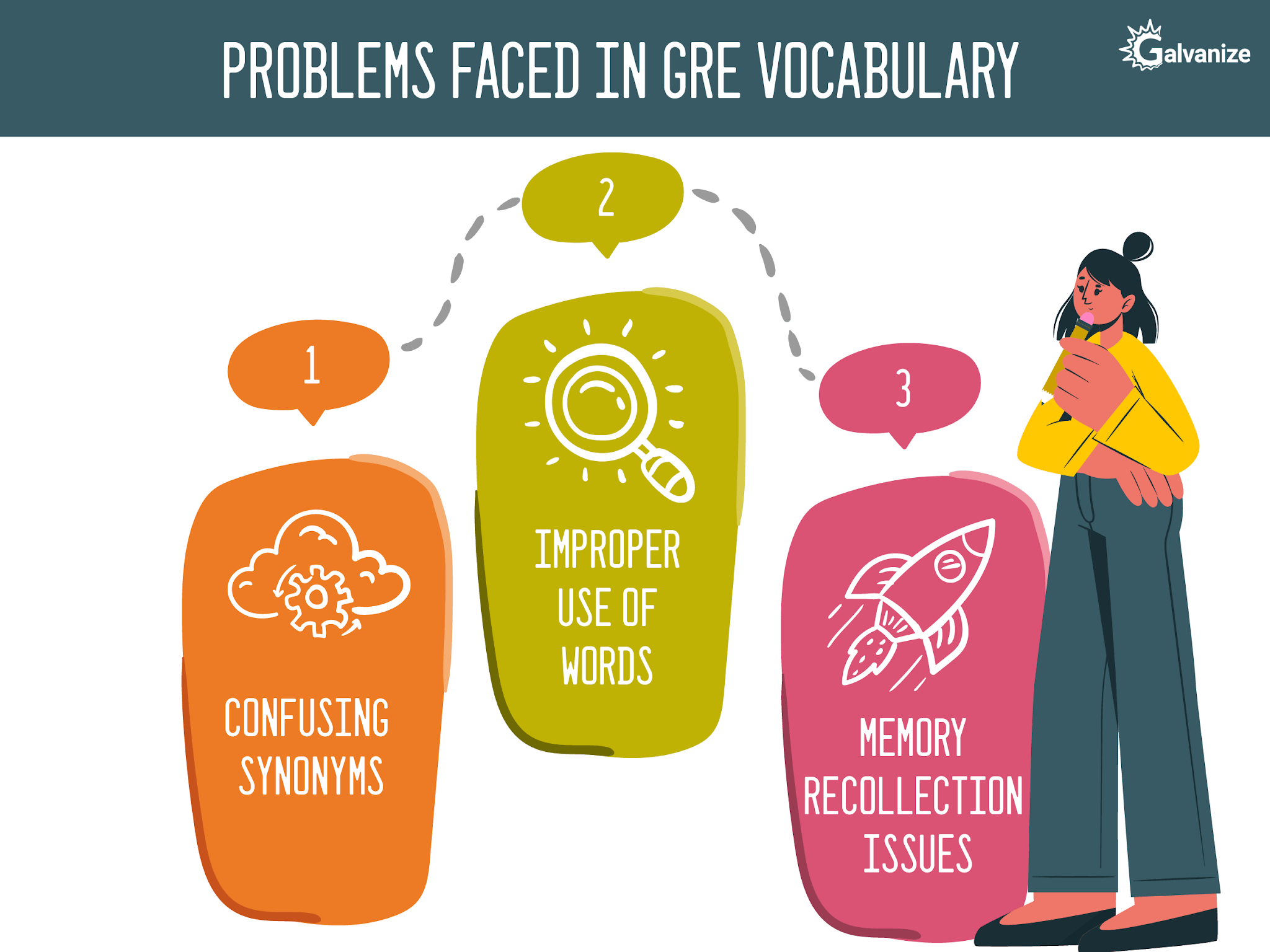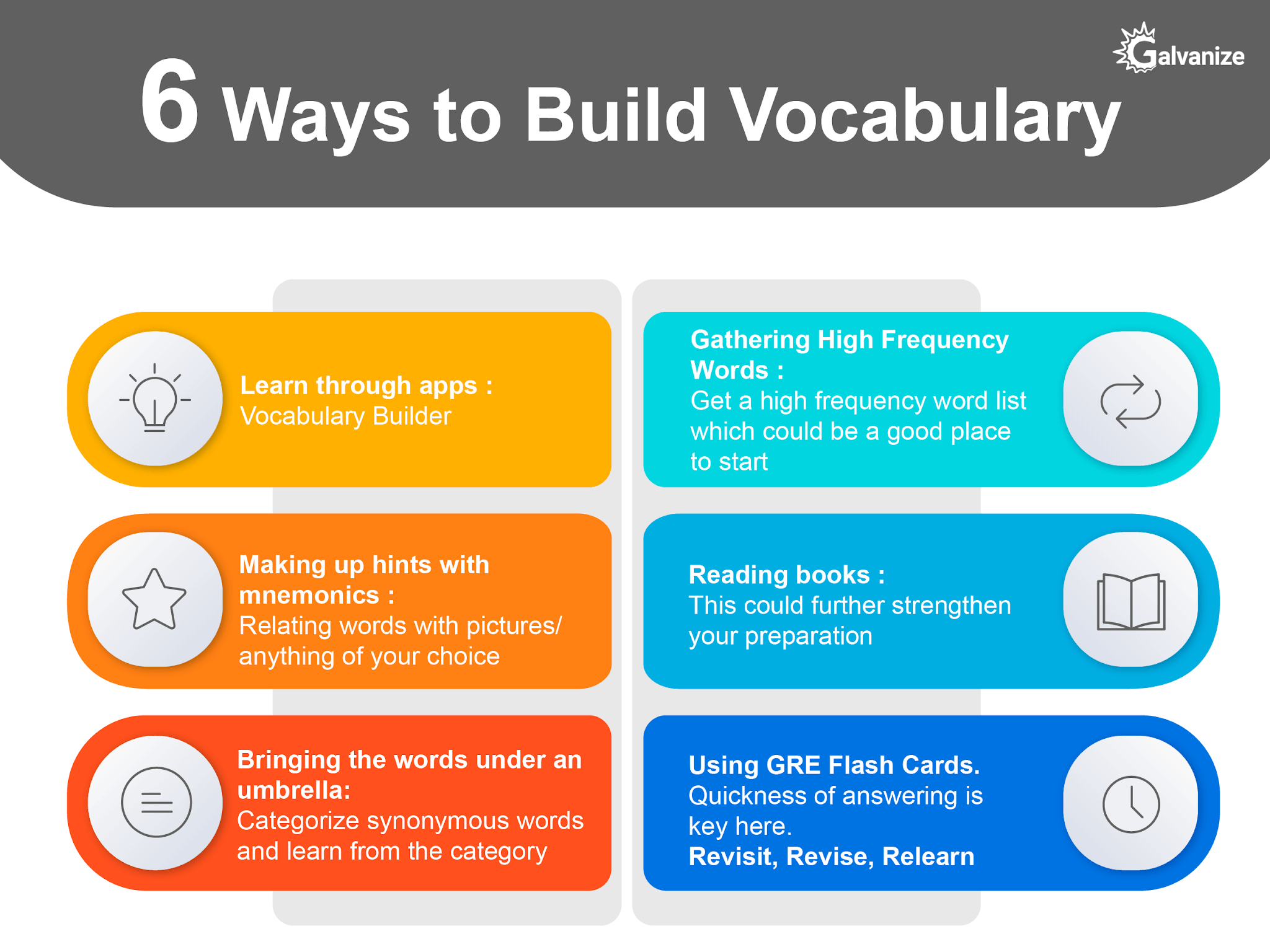![GRE Vocabulary | Problems faced , Vocab Words and Practice [2021 Guide]](https://galvanizetestprep.com/wp-content/uploads/2019/12/GRE-VOCAB.png)
GRE Vocabulary | Problems faced, Vocab Words and Practice [2023 Guide]
Preparing for the GRE might seem like crossing a never-ending ocean. Trying to tackle the vast and complex bank of GRE Vocabulary, in particular, can be a little demotivating. But mastering Vocabulary is the key not only to cracking this exam but also to making it into one of the top universities in the world!
Exams like the GRE that help you gain admission overseas try to check your language competence by way of testing your vocabulary. Increased vocabulary can be of help in an English-speaking country. Hence, the test focuses on developing a diverse set of vocabulary.
Like a guiding compass, our experts at Galvanize Test Prep would like to help you gain an edge in the GRE exam by giving you a few pointers on how to improve your vocabulary!
Problems that you usually face with GRE Vocabulary
Talking to our students while preparing a suitable study plan for them has given us an insight into the challenges they face when it comes to GRE Vocabulary. Here are some of the most common difficulties:
- Confused by words that are synonymous with each other
- Using words in the wrong context
- Inability to reproduce words from one’s memory
Listed below are a few ways that can help you tackle these problems in no time!
6 Ways to Build Your GRE Vocabulary
Regular practice equals consistent progress!
Whenever you have a bunch of words to be memorized, you need to find easier ways to learn them by heart. It is important to keep in mind that a few tricks up your sleeve can go a long way in keeping you well on track with regard to learning. And also, there is always the choice of adapting it to your own learning style! It is important for you to follow a routine where you set a goal for yourself and work accordingly to improve your GRE vocabulary. Sounds preachy? Well, to make it a bit interesting and a lot easier, here are ways that can quicken your pace of learning!
Regular practice equals consistent progress!
Whenever you have a bunch of words to be memorized, you need to find easier ways to learn them by heart. A few tricks up your sleeve can go a long way in keeping you on track with your GRE Vocabulary prep. Also, each student learns in a different way, and hence, you can always adapt these tips to your own learning style! However, it is important to follow a routine with small, attainable goals and work diligently and regularly toward meeting them. Now, here are some ways you can make the best use of your prep time and efficiently expand your vocabulary!
1. Learning through apps – Vocabulary Builder
Statistics from 2018 have reported that a person’s average screen time per day comes up to 3 hours and 15 minutes. Can we use this time for something more productive and make it fun at the same time?
Galvanize’s GRE Vocabulary App is an engaging application designed especially to help learners retain words in their memory with more ease. Visually appealing and with a competitive theme to motivate the user, this app aims to make learning more interesting. You can use it on the go, anywhere, anytime. It has a Vocabulary list of about 1800 words divided into 60 sets that can help you build a strong vocabulary for tests like the GRE. The first set is absolutely free!
We understand our learners’ needs!
- Feedback is important, and you get one after every quiz to emphasize the areas you have to work on!
- Before you start any set, you will be asked to sort out words you already know to focus on the new ones.
- The app helps you learn words through context, everyday examples, pictures, and quizzes!
2. Making up hints with mnemonics
When you have a hard time remembering difficult words, you can relate the words to pictures or something personal so that they stick in your memory.
For example,
- The word ‘abstain,’ meaning restraining oneself from doing something, can be remembered by linking it with ‘stain,’ meaning dirt, which you must not get on your clothes.
- The word ‘laudable’ can be linked to the word ‘lord’ who deserves praise. This will help you arrive at the true meaning of the word—deserving praise and commendation.
- To distinguish between ‘regret’ and ‘sorrow’ is sometimes difficult because they can both be used in a sad situation. Hence, you can remember ‘regret’ by linking it with a moment when you missed the chance to try something new and ‘sorrow’ with the memory of losing something important to you.
Although this method might seem juvenile, it can actually work wonders in keeping your brain hooked. It is this personalized touch that can be helpful in retaining words in your memory and improving your GRE vocabulary.
3. Bringing words under an umbrella
If a lot of words seem synonymous with each other or tend to have a common subject, then categorize those words together.
For example,
Jubilation, Delight, Exuberance, and Glee can all come under the category of ‘Happy’. When you do this, it is easier to organize them for learning.
4. Gathering high-frequency words
If you are having a hard time figuring out where to start, you can look for popular lists of words that commonly appear in competitive exams like the GRE. Lists like Barron’s 800 or 1100 High-Frequency Word Lists can help kick off your vocabulary learning. Use these words during conversations and in your day-to-day communication for effective learning. You can also start with the 1800+ words on the Galvanize Vocabulary Builder app, which has been compiled by language experts who have reviewed past exams.
5. Reading the right books
Books like Word Power Made Easy by Norman Lewis, and Merriam-Webster’s Vocabulary Builder can give an overview of how root words can help in building one’s vocabulary. These books explain how to use common word systems to break down new words and expand your vocabulary.
6. Using GRE Flashcards
An old but tried and true method is using flashcards to learn new words. Of course, you can make your own or use one of the dozens of resources found online. Some might contain pictures to describe each new word, and there are even quizzes available to test your knowledge. Peer learning through quizzes can also work as a motivational factor.
7. Revisit, Revise, Relearn
It is important to go back to the words you learned regularly in order for them to remain in your working memory.
- When you revisit, you will know if all your exercises have been fruitful in boosting your knowledge base.
- When you revise, some words which may have slipped your memory can be refreshed.
- At the end of your revision, you might find that there are still a few words that are difficult to recall. You can then take those words back to your list and find another method to make these words stick in your mind.
Note that you do not have to stick to only one of these methods. Mnemonics, flashcards, and word lists can all be used in combination. Maybe some words are easier to remember through flashcards, but some complex ones might require mnemonics. Using a variety of methods can also help you retain a larger number of words in your memory.
Testing Vocabulary in GRE
Your vocabulary is tested under the GRE Verbal Reasoning section of the paper. You will have a minimum of two Verbal subsections in the paper (with a maximum of three), and these subsections have several question types to put your vocabulary to the test. This is primarily to affirm one’s command over the language. The GRE Verbal Reasoning section contains multiple choice questions which check your understanding of the vocabulary and also your ability to use the word in a particular context appropriately.
Instead of looking at the test as a hurdle to be crossed, it is necessary for you to realize the purpose behind it. Your course of study in an English-speaking country would require you to express your multidisciplinary knowledge in clear and concise words. Be it while writing a research paper, analyzing a text, or giving a presentation, you will need a well-built vocabulary at your disposal!
GRE Vocabulary Words
The best way to ace GRE Vocabulary is to be good with words. Here’s a resource that can help you do just that!
GRE Vocabulary App
Want to try out an addictive gamified Vocabulary App to boost your vocabulary skills?
This app has over 1800 words to help you boost your vocabulary game. It is important to understand that learning vocabulary need not be a tedious task. This application makes it fun!
What more do we need?
Here’s the world’s best-rated Vocabulary App
What do you have to do?
- You are expected not just to read the text at face value but to interpret it as an essential part of comprehension.
- You must use the given information to form a set of conclusions, based on which you must try to answer the given questions.
- About half of the GRE Verbal questions have blanks scattered across a short passage that needs to be filled in using the choices given. The number of choices per blank depends on the number of blanks given on the whole. This is how the GRE test tries to elicit your vocabulary usage.
- Thorough learning plays an important role. Your quickness in answering the questions can help you effectively tackle this exam which has quite a harsh time constraint.
- The best way to approach the vocabulary-centered questions in the Verbal section is always to understand the content of the given paragraph or sentence first. Your goal must be to restore the coherence of the text. So, when going through the options, rule out words that have nothing to do with the topic or do not make logical sense in the context. Note that all the answer choices will make grammatical sense. Hence, only a complete understanding of the logic behind each question will help answer them accurately.
Follow this guide to get tips on “How to score 160+ in GRE Verbal”.
Apart from the above-mentioned tips, what other ways exist that can help you build a strong GRE vocabulary? Let us look at them now!
Read from a wide range of sources:
As a GRE aspirant, you should be reading from a wide range of sources—be it books, articles, publications, or magazines. But why do we recommend this?
Read articles of different genres and topics
This is the best thing you can do while reading for the purpose of building your vocabulary. Reading from a wide range of sources exposes you to different styles of writing, various patterns of thought, and, most importantly, different topics. Since the GRE itself curates it’s questions from different subjects and fields, acclimatizing yourself to such texts will help in processing such advanced content much faster. You will accumulate a lot of knowledge by reading articles from different genres and will also become familiar with the jargon used within that particular genre.
For example, if you are reading articles from Psychology, then you will start to recognize concepts such as catatonic states, schizophrenia, neuroplasticity, and psychosis. However, not just any text will do. The content that you consume must utilize the advanced and complex language that is found in the GRE. Hence, articles from the Guardian, Wall Street Journal, The Economist, Scientific American, etc., are great sources, to begin with.
Word curiosity and contexts:
Whenever you read anything and come across a particular word that you may not be familiar with, we recommend you search for its meaning and, upon understanding its usage, reread the text in which you found it. This will help reinforce this word in your memory. Not only would you have learned the meaning, but you would have also understood its usage in a given sentence, which will further help in vocabulary retention.
Be curious about the meaning of unfamiliar words, and do not get intimidated by them. After all, words are abstract concepts used to help us communicate, not frighten us.
Watch a few TV Series:
The best way to learn any language is to expose oneself to it as much as possible. Since TV is one of the major sources of media consumption in our lives today, it would be a good idea to harness these easily accessible resources to help build our vocabulary. Well-written English TV series and documentaries will help you build your arsenal of words in an exciting and engaging way. Try to watch without the use of subtitles, and listen carefully to the dialogue as it is being spoken. Pick up new words and look up their meanings. This is another effective way to learn.
Do not consider vocabulary building to be a chore. When we attach the word ‘task’ to anything, we tend to lose interest and motivation and begin procrastinating. Take it one step at a time, and let your curiosity lead you. It can’t always be fun, but it need not always be boring or monotonous either. It’s all about your approach and the strategies you employ. Think of words as little decoders, helping you unravel those complicated English passages!
Frequently Asked Questions about GRE Vocabulary
- How many words should we learn per day?
Although we can learn up to 50 words per day, learning even ten words a day can make a difference, depending on your consistency. According to your ability, you can increase the word count as you go. You can use Galvanize’s GRE Vocabulary Builder App to remain consistent in your learning and keep track of your progress by testing yourself.
- Which is the fastest way to learn GRE words?
There are shortcuts to make learning easier and more efficient but to guarantee fast learning, you must make use of your strengths. Some might have a longer attention span which they can use to their benefit by increasing the number of words to be learned per day. Others who struggle with memorization can use some of the fun and interesting methods described above to aid their learning process.
Try: GRE Practice test with score analysis
Still have questions, write to us in the comments below!
Related Blogs
- GRE Reading Comprehension | With Practice Questions and Answer’s
- How to Score a 160+ on the GRE Verbal | Tips, Pattern, Practice Questions & Scores
- A Killer Guide to Analytical Writing Assessment | With Samples for Practice
- GRE 101: A Complete Guide To GRE
- Free Online GRE Practice Test with Score Analysis
- GRE Quant :Time Management Tips
- Score a perfect 170 in GRE Math
Where is GRE vocabulary tested?
- It is tested under the GRE Verbal Reasoning section with MCQs
What are the general problems faced by students in GRE Vocabulary?
- These are some of the common problems faced by students: confusing synonyms, inaccurate usage of words, and memory recollection.
What are some good ways to improve GRE Vocabulary?
- The Vocabulary Builder App, mnemonics, categorizing words, high-frequency word lists, books, and flashcards are all good ways to help in improving one’s GRE Vocabulary.
Quick Summary:
- Improving your vocabulary will not only help you ace the GRE but is also essential to thriving in an English-speaking country. This level of mastery is what the GRE Vocabulary section aims to achieve.
- Vocabulary is tested under GRE Verbal Reasoning as MCQs.
- Common student problems: confusing synonyms, inaccurate usage of words, and memory recollection.6 Ways To Build Your Vocabulary:
- Learn through apps: The Vocabulary Builder App makes this process easier and more fun!
- Making up hints with mnemonics: Relating words with pictures, memories, or anything that is unique and memorable.
- Bringing the words under an umbrella: Categorize synonymous words.
- Gathering High-Frequency Words: High-frequency word lists are a good vocabulary resource.
- Reading books: Some books on improving one’s vocabulary can provide effective strategies.
- Using GRE Flash Cards: This is a good way to test your current level and improve. Speed in answering is key here.
- Revisit, Revise, Relearn.












